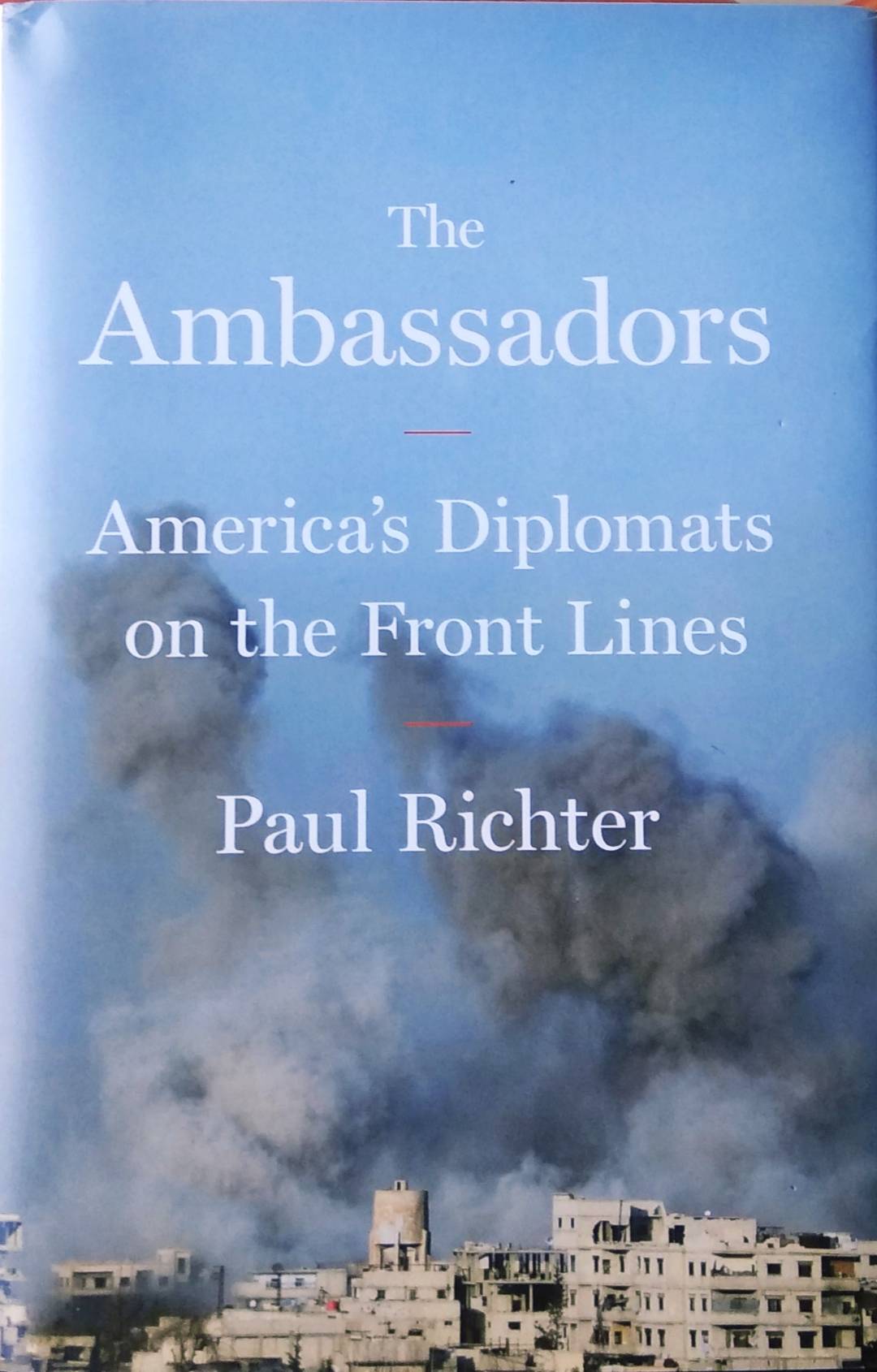Bhaskar Parichha

‘The Ambassadors – America’s Diplomats on the Front Lines’ (Simon & Schuster US and Harper Collins Publishers India) by Veteran diplomatic correspondent Paul Richter goes behind the battles and the headlines to show how American ambassadors are the unconventional warriors in the Muslim world. It explains how these envoys run local government, directing drone strikes, nation-building, and risking their lives on the front lines.
They are, according to the author, the State Department’s heroes, avant-garde diplomats and have been crucial in the line of national defense for two decades of wars in the Middle East.
Take, for instance, Ryan Crocker’s effort to organize a new Afghan government after the fall of the Taliban, even threatening the life of a Pashtun warlord – a US ally – to ensure that a column of tanks could join US forces in the biggest battle of the Afghan war. Or Robert Ford, the sole American official for the province of Najaf in central Iraq, tries to restart the economy and deal with growing militia violence and who is taken hostage by a Shia militia. The stories told in an impeccable style are spellbinding.
Yet another emissary J. Christopher Stevens is chased by government thugs for defying the country’s ruler. He is smuggled into Libya as U.S. Envoy during its bloody civil war, then returns as ambassador only to be killed during a terror attach in Benghazi. Likewise, War-zone veteran Anne Patterson is sent to Pakistan, considered the world’s most dangerous country, to broker deals that prevent a government collapse and to help guide the secret war on jihadists.
The book – divided into seventeen chapters – gives an account of how these diplomats in the wars in the Middle East and the Muslim world provide how these wars are being fought. Richter does an in-depth look into the complexity and length of these wars and nation-building.
In the introductory chapter ( The Best People for the Worst Places), Richter writes: ‘On a mild day in February 2009, President Barack Obama appeared before 2,000 camouflage-clad Marines in Camp Lejeune, North Carolina, to announce plans to wind down the Iraq war. American and foreign audiences had been waiting for months to hear how the new president would deal with the six-year-old conflict, and his remarks drew worldwide attention. Almost unnoticed in the text was a line thanking a career diplomat who as ambassador to Iraq helped shape a successful effort to check the country’s bloody insurgency. Americans owed a debt of gratitude to Ryan C. Crocker, an “unsung hero” who had always sought the toughest assignments and was “an example of the very best our country has to offer,” Obama said.
Richter says: ‘In the aftermath of 9/11, the country began dispatching waves of troops and civilian specialists to the Middle East and South Asia to try to overcome security threats and steady fractured societies. These ambassadors, practicing new diplomacy of the front lines, became Washington, D.C.’s pre-eminent troubleshooters and primary links to foreign leaders. Presidents and secretaries of state sometimes heeded their advice and sometimes didn’t. But even when they chose a different path, they continued to seek out these ambassadors to ask their guidance and recruit them for new assignments.’
According to Richter, the first American intervention came within a month of 9/11 when U.S., British, and Afghan forces routed the Taliban government, which had provided a haven for the Al Qaeda terrorists who attacked the United States. Within days after the Taliban fled the capital of Kabul, a small landing party of U.S. diplomats arrived there to help set up the replacement government that had been organized by world powers.
‘Eighteen months later, 177,000 U.S. and allied troops invaded Iraq to oust Saddam Hussein, whom they incorrectly believed to be developing nuclear arms that threatened the world. Saddam’s fall left the country in chaos and opened years of bloody struggle among Iraq’s ethnic and religious groups. The Pentagon was first put in charge of running postwar Iraq, but U.S. diplomats took an ever-larger role over the next eight years in efforts to build a functioning state, ‘says the book.
The story of these diplomats’ experiences, writes Richter in his razor-sharp approach, offers a window onto the history and lessons of America’s long struggle. Dispatched repeatedly to the most important and difficult posts, these Foreign Service hands saw the conflicts from all angles. They met with warlords and terrorist chiefs and witnessed bloody civil strife from street corners. They heard the whispered secrets of Arab rulers and took part in White House strategy sessions.
Richter’s assessment is sometimes honest: These ambassadors did not have all the answers. But through their many tours they learned at closest range what happened in embattled capitals and on the far sides of the blast walls and razor wire. They saw which of Washington’s decisions brought progress and which led to disaster.
Richter further writes, ‘when the Trump administration arrived in 2017, the Foreign Service’s problem wasn’t indifference but hostility. Skeptical of traditional foreign policy and its practitioners, the Trump team sought to cut the State Department’s budget by 30 percent in its first year, 25 percent in its second, and 23 percent in its third. It shuttered offices that had been occupied by diplomats and gave top foreign policy posts to military officers and cable news personalities. Two years into the administration, almost one half of the State Department’s top jobs remained unfilled.’
Paul Richter’s account of the role of the Ambassadors is a critical piece of modern day history and political science. This is a book that captures the incredible courage, sacrifice and unwavering patriotism of the unsung heroes of the war on terrorism. Richter has brilliantly portrayed these remarkable icons of the Foreign Service. A must-read for anyone interested in U.S. foreign policy and what it takes to be an American hero!






















